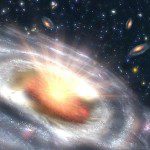
I’m back to reading Bruce Rosenblum and Fred Kuttner, Quantum Enigma: Physics Encounters Consciousness, 2d ed. (Oxford and New York: Oxford University Press, 2011). At the time they wrote the book, both Rosenblum and Kuttner were members of the physics faculty at the University of California at Santa Cruz.
In this passage, the now late Professor Rosenblum, the senior of the two, recalls his experience as a much younger man who was studying at Columbia University in New York City:
As a graduate student, I puzzled about the . . . “wave-particle duality.” It’s the paradox that, looking one way, you could demonstrate an atom to be a compact object concentrated in one place. However, looking differently, you could demonstrate exactly the opposite. You could show that the atom was not a compact object, that it was a wave spread out over a wide region. That contradiction puzzled me, but I assumed that if I spent some hours thinking it through, I’d see it all clearly — the way my professors seemed to. As a graduate student, I had more pressing things to do. (4)
The passage above caught my attention because, within just the past week or so, somebody commenting here — I’ve forgotten who it was, though it was definitely a critic — was complacently explaining to someone else who had cited “wave-particle duality” as an example of seemingly contradictory ideas that are, in fact, both true, that he sees no contradiction and, apparently, understands it all clearly. But nobody understands it all clearly.
Quantum theory is at the base of every natural science from chemistry to cosmology. We need quantum theory to understand why the sun shines, how TV sets produce pictures, why grass is green, and how the universe developed from the Big Bang. Modern technology is based on devices designed with quantum theory. (6)
Quantum theory is stunningly successful. Not a single one of the theory’s predictions has ever been shown wrong. One-third of our economy depends on products based on it. However, the worldview demanded by quantum theory is not only stranger than we might suppose, it’s stranger than we can suppose. Let’s see why.
Most of us share these commonsense intuitions: A single object can’t be in two far-apart places at once. And, surely, what someone decides to do here cannot instantly affect what happens someplace far away. And doesn’t it go without saying that there’s a real world “out there,” whether or not we look at it? Quantum mechanics challenges each of these intuitions. J. M. Jauch tells us: “For many thoughtful physicists, [the deeper meaning of quantum mechanics] has remained a kind of skeleton in the closet.” (5)












